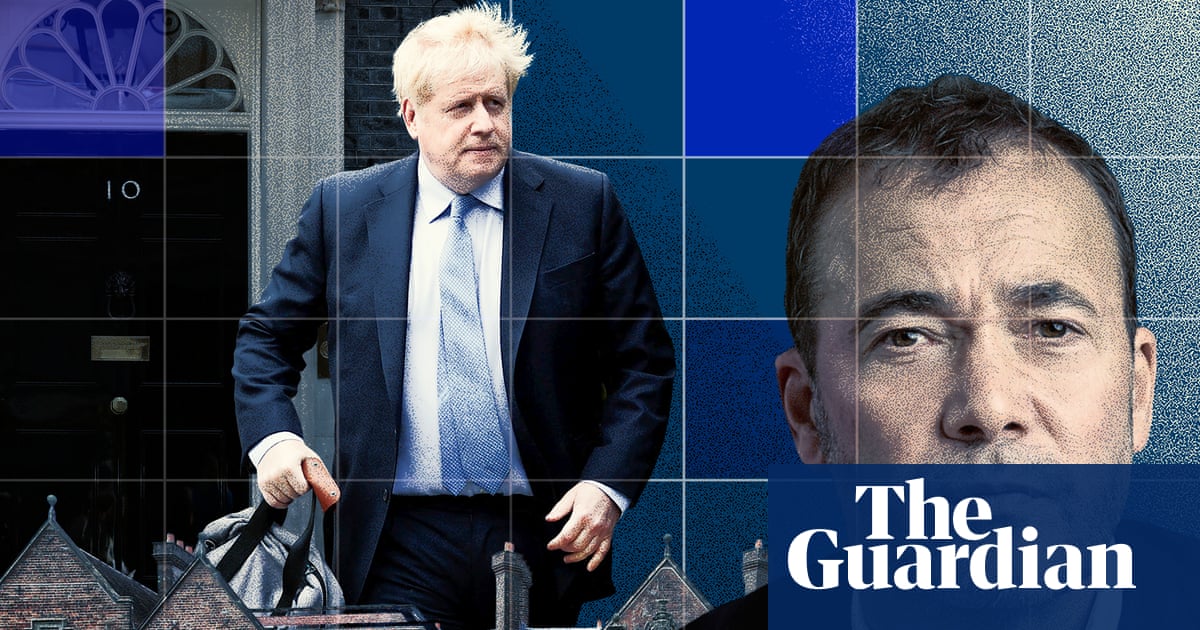The publisher of the Washington Post, Will Lewis, is facing fresh questions over his independence after a cache of leaked files revealed he gave extensive support to Boris Johnson as a secret political adviser when Johnson was prime minister.
The files shed light on how the media executive, who at the time was vice-chair of the Associated Press news agency, worked behind the scenes with Johnson as his premiership was engulfed by a series of scandals.
Lewis’s meetings with Johnson, which took place over a six-month period in 2022, were not disclosed in official transparency records, in an apparent breach of government rules.
In July 2022, on the eve of Johnson’s announcement that he would resign from government, Lewis spent the day in 10 Downing Street and worked closely with Johnson and his advisers.
Lewis appears to have arrived early in the morning, at 7.50am, and took part in at least six meetings during the day, including a gathering of Johnson’s aides to prepare him for prime minister’s questions (PMQs) in the House of Commons.
In the meetings, which stretched into the evening, Lewis appears to have participated in gatherings of Johnson’s closest political allies, including several MPs and a senior minister, as the prime minister came under intense pressure to step down.
Details of the extent of Lewis’s support for Johnson are revealed in official government logs that provide a minute-by-minute record of the prime minister’s activities. The logs are marked “official – sensitive”.
The records are contained in the Boris Files, a cache of documents obtained by Distributed Denial of Secrets, a US non-profit that archives data leaks, and seen by the Guardian.
According to the files, Lewis spoke or met with the prime minister on at least 11 occasions between February and July 2022. In total, Lewis appears to have provided Johnson with at least 15 hours of political advice during this period.
The exposure of the meetings raises questions for Lewis about his proximity to political power and whether his role advising a serving UK prime minister amounted to a conflict of interest with his role at AP.
It also places a spotlight on Lewis’s relationship with Johnson, who nominated the media executive for a knighthood for “political and public service” after leaving office.
Will Lewis in 2006 when he was editor of the Daily Telegraph. Photograph: Independent/Alamy
Lewis was editor of the Daily Telegraph in the 2000s when Johnson was a columnist for the paper. Lewis then spent a decade at companies controlled by Rupert Murdoch, including the UK-based News Group Newspapers (NGN) when it was dealing with allegations of past phone hacking.
His tenure at the Washington Post has been mired in controversy after allegations recently emerged in court proceedings that he was involved in an effort by NGN to “actively frustrate” a police inquiry into phone hacking. Lewis and NGN have strongly denied the allegations.
A source close to Lewis said he “has been transparent about his personal relationship” with Johnson.
An AP spokesperson said its board members provided oversight of AP’s executive leadership and had “no involvement” in its journalism. “Board directors hold a wide range of roles outside of AP,” they said.
A Cabinet Office source said it was Johnson’s responsibility “to account for his meetings”. The former prime minister did not respond to a request for comment.
Frequent visitor
It has previously been reported that Lewis provided informal advice to Johnson. The Guardian reported last year that he allegedly advised Johnson to “clean up” phone data relating to the Covid-19 rule-breaking scandal known as Partygate.
Under ministerial rules, Johnson would have been expected to disclose any meeting held with a senior media executive, but Lewis does not appear in public transparency records.
The omission has meant that the extent of Lewis’s involvement in shaping Johnson’s response to a rolling series of scandals that would end his term as prime minister was unknown until now.
According to the leaked minute-by-minute logs, Lewis was a frequent visitor at Downing Street and Chequers, the prime minister’s official countryside residence, as Johnson fought in vain to save his premiership in 2022.
Will Lewis speaking to Washington Post staff in November 2023 after becoming its publisher. Photograph: The Washington Post/Getty Images
Lewis first appears in the logs on 2 February when he joined a call with Johnson and a Conservative political strategist. After four of Johnson’s senior aides quit the next day, Lewis joined several meetings in Downing Street on 4 February and he appears to have spent a part of the morning alone with the prime minister.
At the time, Johnson was facing calls to resign amid dissent within his own party and a widening police investigation into lockdown-breaking parties.
Johnson was able to withstand the pressure for several months longer, but in early July he became embroiled in a fresh scandal, sparking the resignations of two of his most senior ministers.
The day after, on 6 July, Lewis joined the prime minister’s first meeting of the day along with Ross Kempsell, then a close ally and political fixer to Johnson.
Lewis remained at the prime minister’s side that morning. In the logs, officials recorded that Johnson was “in office with Will Lewis (vice chair of the Associated Press)” along with two loyal ministers.
Lewis attended additional meetings in Downing Street during the day as ministers quit Johnson’s government en masse. He was also with Johnson in the evening as the prime minister and his advisers tried to salvage his position.
On 7 July, Lewis again joined Johnson’s first meeting of the day, according to the logs, hours before the prime minister publicly announced he would resign. Lewis continued to advise Johnson in the following days as the government faced a vote of no confidence.
He returned to Downing Street as Johnson prepared for his final appearance as prime minister in the House of Commons. For an hour on the morning of 20 July, officials noted, Johnson was engaged in “PMQs prep with Ross Kempsell and Will Lewis”.
Additional reporting by Stephanie Kirchgaessner
Quick GuideContact us about this storyShow
The best public interest journalism relies on first-hand accounts from people in the know.
If you have something to share on this subject you can contact us confidentially using the following methods.
Secure Messaging in the Guardian app
The Guardian app has a tool to send tips about stories. Messages are end to end encrypted and concealed within the routine activity that every Guardian mobile app performs. This prevents an observer from knowing that you are communicating with us at all, let alone what is being said.
If you don’t already have the Guardian app, download it (iOS/Android) and go to the menu. Select ‘Secure Messaging’.
SecureDrop, instant messengers, email, telephone and post
If you can safely use the tor network without being observed or monitored you can send messages and documents to the Guardian via our SecureDrop platform.
Finally, our guide at theguardian.com/tips lists several ways to contact us securely, and discusses the pros and cons of each.
Illustration: Guardian Design / Rich Cousins
Thank you for your feedback.

